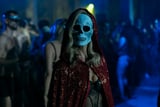Mike Flanagan’s highly anticipated screen adaptation “The Fall of the House of Usher” is finally here, just in time for Halloween. The limited Netflix series is loosely based on Edgar Allan Poe’s eponymous 1939 short story but takes many more creative liberties as far as text-to-TV adaptations go, and it’s safe to say all the bold choices pay off splendidly in this case. Since its Oct. 12 release on the streamer, the eight-part gothic fictional drama has garnered rave reviews from critics and audiences alike, drawing an impressive 7.9 million views in its first week of streaming, according to Variety.
However, it’s worth noting that Flanagan’s dark, twisted take on Poe’s bodies of work isn’t restricted to the titular piece by the 19th-century Gothic fictional genius. In fact, the Netflix iteration deftly taps into the many archival pieces of Poe to reimagine – with occasional rehashes – the subversive and gory tale of the infamous fictional Usher clan. Steeped in psychological terror, the overarching story, along with its many individual character arcs and plot points, mines more than a dozen literature pieces penned by Poe to create something truly original by expanding on the source materials. But that’s not the only way the show creators pay homage to Poe’s intricately unique and innovative literary legacy. Plenty of clever references and Easter eggs are sprinkled across the eight episodes as a love letter dedicated to the rich tapestry of one of the greatest literary giants.
Whether it’s a direct quotation culled from his poetic writings, a nod to his personal life, or a subtle usage of imagery and dark prophecies prominent through Poe’s literature, we’ve rounded up all interesting Poe references we spotted in “The Fall of the House of Usher” ahead. Read on to learn all about the cryptic hints in Poe’s work you might’ve missed during your first watch of the latest supernatural drama – because there are so many.

